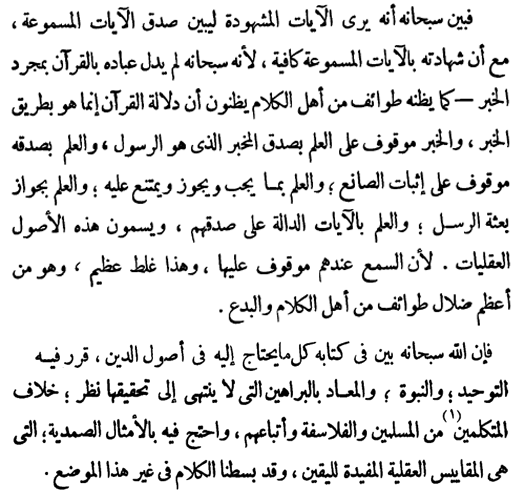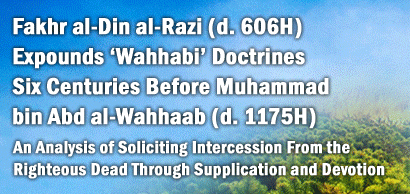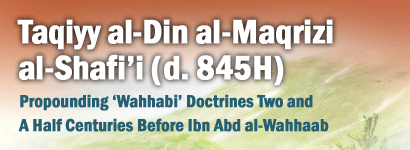 |
You are here:
The Mutafalsifah (Philosophers) and Mutakallimun (speculative theologians) are both agreed that the Qur'an is mere akhbaar (reports) and this is one of their greatest foundations. What they mean by this is that the Qur'an does not contain any independent rational proofs to validate itself, and that to rely upon the Qur'an to prove the Qur'an's validity is circular reasoning, and that the only route is through independent reason without reference to the Qur'an at all. However, this notion is rejected by the Qur'an and by agreement of the Salaf. The refutation of their stance and approach is plentiful in the Book, Sunnah and sayings of the Salaf and scholars of Ahl al-Sunnah and here Ibn Taymiyyah simply alludes to the matter. We will take up this issue in other articles inshaa'Allaah.
Shaykh al-Islaam Ibn Taymiyyah said:

 So He explained (in al-Fussilat 41:53) that He will show the witnessed signs in order to clarify the truthfulness of the heard (recited) signs alongside the [fact] that the heard (recited) signs are sufficient [on their own], because He, the Sublime, did not direct His servants through pure information (khabar) alone as is presumed by factions of the Ahl al-Kalaam who think that the evidence of the Qur'an is provided only through the route of khabar (conveying of information), and that [acceptance] of the khabar is dependent upon knowledge of the truthfulness of the one who conveyed it, which is the Messenger, and knowledge of his truthfulness is dependent upon a) the affirmation of the Creator and b) knowledge of what is obligatory, permitted and impossible for Him, and c) knowledge of the permissiblity of Messengers being sent and d) knowledge of the signs which indicate their (the Messengers') truthfulness, and they label these foundations as "rationalities" (aqliyyaat), because the revelation (al-sam') is dependent upon them. And this is a great error and it is from the greatest of the misguidance of the various factions of the people of theological rhetoric (kalaam) and innovations. So He explained (in al-Fussilat 41:53) that He will show the witnessed signs in order to clarify the truthfulness of the heard (recited) signs alongside the [fact] that the heard (recited) signs are sufficient [on their own], because He, the Sublime, did not direct His servants through pure information (khabar) alone as is presumed by factions of the Ahl al-Kalaam who think that the evidence of the Qur'an is provided only through the route of khabar (conveying of information), and that [acceptance] of the khabar is dependent upon knowledge of the truthfulness of the one who conveyed it, which is the Messenger, and knowledge of his truthfulness is dependent upon a) the affirmation of the Creator and b) knowledge of what is obligatory, permitted and impossible for Him, and c) knowledge of the permissiblity of Messengers being sent and d) knowledge of the signs which indicate their (the Messengers') truthfulness, and they label these foundations as "rationalities" (aqliyyaat), because the revelation (al-sam') is dependent upon them. And this is a great error and it is from the greatest of the misguidance of the various factions of the people of theological rhetoric (kalaam) and innovations.
For Allaah the Sublime has explained everything that is required of the foundations of the religion (usul al-din) in His Book. He corroborated therein al-Tawhid (monotheism), al-Nubuwwah (prophethood), and al-Ma'aad (resurrection) with manifest evidences whose verification are not subject to any observation, as opposed to the (evidences of the) Mutakallimin from the Muslims and the Mutafalsifah and their followers. For He (Allaah) provided evidence therein with self-evident, upholding similitudes which are the rational standards (of evidence) providing certainty (yaqeen) and we have spoke extensively (on this matter) in other than this place. Majmu' al-Fatawa (3/331).
The Mutakallimin of Islam took the proof used by the Sabean star-worshippers (see this article) to establish the origination of the universe, and this came into Islam through al-Ja'd bin Dirham, al-Jahm bin Safwan, and then passed through to the Mu'tazilah, then the other factions of kalaam such as the Rafidi Mujassimah, the Karraamiyyah Mujassimah and the Ash'ari and Maturidi Mu'attilah. It became the foundation of their theology and speech about Allaah and this specifically was the ilm al-kalaam that the Salaf condemned. Because they were all trying to validate this proof in their own ways and had their own renderings of it, some were led to ta'teel and others to tajseem and some negated all of what Allaah affirmed for Himself (of names, attributes and actions) and others only made partial negation.
Link to this article: Show:
HTML Link •
Full Link •
Short Link
Share or Bookmark this page: You will need to have an account with the selected service in order to post links or bookmark this page.







|
|
|
Related Articles:
Add a Comment
You must be registered and logged in to comment.
|
 |




|
 |




 So He explained (in al-Fussilat 41:53) that He will show the witnessed signs in order to clarify the truthfulness of the heard (recited) signs alongside the [fact] that the heard (recited) signs are sufficient [on their own], because He, the Sublime, did not direct His servants through pure information (khabar) alone as is presumed by factions of the
So He explained (in al-Fussilat 41:53) that He will show the witnessed signs in order to clarify the truthfulness of the heard (recited) signs alongside the [fact] that the heard (recited) signs are sufficient [on their own], because He, the Sublime, did not direct His servants through pure information (khabar) alone as is presumed by factions of the 








